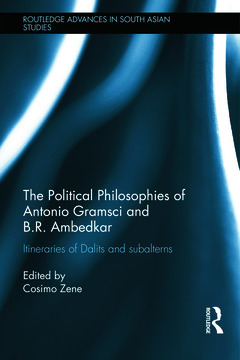Description
The Political Philosophies of Antonio Gramsci and B. R. Ambedkar
Itineraries of Dalits and Subalterns
Routledge Advances in South Asian Studies Series
Language: English
Keywords
subaltern; group; prison; notebooks; passive; revolution; southern; question; dalit; literature; Dalit Autobiographical; Dalit Literature; Dalit Writers; SCW; Round Table; Round Table Conference; Green 2011a; Tamil Nadu; Triratna Buddhist Community; Dalit Women; Schedule Caste Federation; Civil Society; Brahminical Hegemony; Common Language; Subaltern Social Groups; Young Men; Dalit Activists; NGO Worker; Subaltern Strata; BCIT; Religious Intellectuals; Southern Question; Dalit Buddhists; Prison Notebooks; Spontaneous Philosophy
Publication date: 10-2013
Support: Print on demand
Publication date: 10-2017
· 15.6x23.4 cm · Paperback
Description
/li>Contents
/li>Readership
/li>Biography
/li>
Bridging two generations of scholarship on social inequality and modern political forms, this book examines the political philosophies of inclusion of subalterns/Dalits in Gramsci and Ambedkar?s political philosophies. It highlights the full range of Gramsci?s ?philosophy of praxis? and presents a more critical appreciation of his thought in the study of South Asian societies. Equally, Ambedkar?s thought and philosophy is put to the forefront and acquires a prominence in the international context.
Overcoming geographical, cultural and disciplinary boundaries, the book gives relevance to the subalterns. Following the lead of Gramsci and Ambedkar, the contributors are committed, apart from underscoring the historical roots of subalternity, to uncovering the subalterns? presence in social, economic, cultural, educational, literary, legal and religious grounds. The book offers a renewed critical approach to Gramsci and Ambedkar and expands on their findings in order to offer a present-day political focus into one of the most crucial themes of contemporary society.
This book is of interest to an interdisciplinary audience, including political theory, post-colonial studies, subaltern studies, comparative political philosophy, Dalit studies, cultural studies, South Asian studies and the study of religions.
1. Subalterns and Dalits in Gramsci and Ambedkar: A prologue to a ‘posthumous’ dialogue Part 1: The Emergence of Subaltern/Dalit Subjectivity and Historical Agency 2. Subaltern Social Groups in Antonio Gramsci’s Prison Notebooks 3. Revisiting Interwar Thought: Stigma, Labor, and the Immanence of Caste-Class 4. The Other Prince: Ambedkar, Constitutional Democracy, and the Agency of the Law Part 2: The Function of Intellectuals 5. Notes on Q6§32: Gramsci and the Dalits 6. Limits of the Organic Intellectual: a Gramscian reading of Ambedkar Part 3: Subalternity and Common Sense 7. Living Subalternity: Antonio Gramsci’s Concept of Common Sense 8. Race, Class, & Religion: Gramsci’s Conception of Subalternity 9. The Risorgimento and its Discontents. Gramsci’s Reflections on Conflict and Control in the Aftermath of Italy’s Unification Part 4: Dalit Literature, Subalternity and Consciousness 10. Hegemony and Consciousness - building Processes in Dalit Literature 11. Consciousness, Agency and Humiliation: Reflections on Dalit Life Writing and Subalternity Part 5: The Religion of the Subalterns/Dalits 12. Why does religion matter to politics? Truth and ideology in a Gramscian approach 13. Intellectuals and Subalterns in the Context of Religion 14. The Place of ‘Practical Spirituality’ in the Lives of the Dalit Buddhists in Pune 15. Conclusion: Which Itineraries for Dalits, Subalterns and Intellectuals?
Cosimo Zene is Head of Department in the Study of Religions Department at SOAS, University of London, UK. His publications include The Rishi of Bangladesh, (2002, Routledge), and a special issue of Culture and Religion on 'Religion in Gramsci' (forthcoming, Taylor & Francis).
These books may interest you

Rethinking Gramsci 64.97 €



